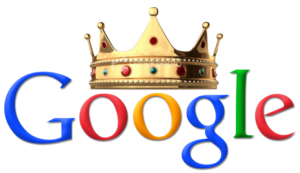Google, Bing, and Yahoo— Part 2: Why Google is King

Get caught up by reading The Difference Between Google, Bing, and Yahoo Part 1.
Recently we published an article about the differences between Google, Bing, and Yahoo search engine results pages (SERPs). The post focused on the actual search differences, features, and results on the SERPs. For some searches, Google is clearly better. For some searches, Bing and Yahoo are arguably superior. And for other searches, the three players are fairly comparable.
However, a discussion of the differences between Google, Bing, and Yahoo, and the subsequent discussion of why Google dominates the search market, necessitates a thorough discussion of each company’s products, services, and activities—beyond just a raw comparison of the SERPs. The companies and brands themselves are very different. And those differences directly and indirectly influence each brand’s search market share.
Missions
To begin, we need to look at the mission statements of each company. Successful companies have strong mission statements, and the closer they adhere to their missions, the more likely they are to rise above their competition.
Google’s mission is to “organize the world’s information and make it universally accessible and useful.” Understanding this mission helps us understand the products and services Google offers. For example, some Google products may seem tangential from a search engine viewpoint: How do Gmail or Google Docs relate to Google search…? However, in terms of organizing information and making that information accessible and useful, Gmail and Google Docs make perfect sense. Even products such as Google Wallet and self-driven cars make sense if you get to the core of Google’s mission. And those products directly impact Google’s popularity.
Bing
Bing’s mission is somewhat difficult to find and discern. This, perhaps, makes sense since Bing is a Microsoft product and not a company like Google and Yahoo. I did find a Bing blog post from 2013 that states, “At Bing our central mission is to help you search less and do more. To that end, we’re constantly looking for ways to make your search experience more efficient.”
If Bing’s mission is to help us search less and do more, then Bing is living up to that mission by following in Google’s footsteps and improving its SERPs through its own versions of answer boxes, knowledge graphs, and maps. However, by being tied to a parent company and a search-centric mission, Bing is not able to develop and brand additional products that extend beyond the scope of searching the internet.
Yahoo
Yahoo’s mission is to “make the world’s daily habits inspiring and entertaining.” Yahoo’s website goes on to clarify:“whether you’re searching the web, emailing friends, sharing photos with family, or simply checking the weather, sports scores or stock quotes.”
As is the case with Google, search is part of a higher goal for Yahoo. Search is certainly a day-to-day activity for every person with an internet connection, so Yahoo search directly correlates with Yahoo’s mission. Yahoo’s mission also clarifies why Yahoo is an email provider, why Yahoo’s homepage has so many features, and why Yahoo purchased the popular media- and photo-sharing sites Flikr and Tumblr.
 Partnering with Bing makes sense as well: Using Bing’s engine, Yahoo can focus less on search engineering and more on “inspiring and entertaining.” However, the partnership only makes sense if the search results get the job done in an inspiring and entertaining way. Currently, Yahoo search is plain and boring and the disconnect between Yahoo’s search product and mission statement contributes to Yahoo’s poor market share.
Partnering with Bing makes sense as well: Using Bing’s engine, Yahoo can focus less on search engineering and more on “inspiring and entertaining.” However, the partnership only makes sense if the search results get the job done in an inspiring and entertaining way. Currently, Yahoo search is plain and boring and the disconnect between Yahoo’s search product and mission statement contributes to Yahoo’s poor market share.
Innovation & Branding
Creating products in harmony with a mission statement is not enough by itself to push a company ahead of the competition. Companies need to continuously innovate to improve their products and create new products that solve consumers’ pain points. Companies also need brand their innovations to link consumers’ positive experiences back to the company.
Google’s original product was internet search. It has since branched into email, maps, browsers, cloud storage, word processors, spreadsheets, video, photo editing, website design and hosting, social, mobile OS, and much more—all in an effort to organize and make accessible the world’s information. The combination of innovation, timing, quality, and integration of Google’s products contributes to Google’s overall success. Google isn’t always (or ever) first to market, but its products often address major pain points and solve problems that users didn’t even know they had.
 For example, Google Drive was not the first cloud-based storage system. Nor was Google Docs the first internet-based, free word processor. But Google incorporated Drive into users’ existing email accounts, provided free email platforms to businesses, and made document accessibility, sharing, and collaboration a free, convenient, and viable option for business and individuals. Thus continuing to help organize and make accessible the world’s information.
For example, Google Drive was not the first cloud-based storage system. Nor was Google Docs the first internet-based, free word processor. But Google incorporated Drive into users’ existing email accounts, provided free email platforms to businesses, and made document accessibility, sharing, and collaboration a free, convenient, and viable option for business and individuals. Thus continuing to help organize and make accessible the world’s information.
On a side note, Google has also done a great job of branding their products. Each product is called “Google X,” e.g., Google Maps, Google Docs, Google Translate, etc. so “Google” is always in the forefront of the users’ minds as they use Google products.
Bing
In light of product innovation and branding, Bing is at a major disadvantage. As stated earlier, since Bing is tied to a parent company and has a mission statement focused on search, it cannot build and brand products beyond the scope of search. While we continue to hear about new Google innovations—keeping us continually aware of the brand—we only hear Bing’s name if something happens specifically with Bing in the search world.
Using our cloud-based storage and collaboration example, Microsoft finally modernized and created free, online versions of the Office Suite in answer to Google Drive. However, Office Online is tied to Microsoft’s name and is not connected to the Bing brand. Bing misses out on the connection between a positive product and its name.
Yahoo
The array of Yahoo products is more obvious than Google’s products, as Yahoo’s are all well-organized and nicely displayed on the Yahoo homepage. By the numbers, Yahoo has more product offerings than Google and the products align well with Yahoo’s mission.
But Yahoo’s products do not increase Yahoo search popularity because its products are not innovative, revolutionary, or otherwise superior to any of the alternatives. Indeed, some Yahoo products just look like Pinterest searches with more obvious and annoying ads.
Tumblr and Flikr may be two of Yahoo’s most popular products, but both retain their individual branding, much like Google’s YouTube, and thus offer Yahoo no additional branding benefit or popularity. The difference between Yahoo’s and Google’s acquisitions is that Google requires a Google account to sign in and participate while Yahoo does not obviously connect its brand with its acquisitions.
Without market-leading innovation or acquisition branding, the only competitive edge for Yahoo, then, comes in the ease of accessibility of each product for those who find Yahoo’s home page a convenient portal for their daily activities. And so far this ease of access has not enticed many away from Google and Bing.
Integration
A final aspect of each brand and company that we need to consider is integration within and across desktop and mobile platforms. Certainly a major factor of success for any company or product lies in its accessibility and integration with other products and services consumers use.
Since Google owns the most popular browser and the most popular smartphone operating system, the convenience of using Google products continues to boost its popularity and familiarity. Google offers a continuous experience across desktop and mobile devices—something that Bing and Yahoo cannot. This continuous experience offers an unmatched level of convenience which speaks to the core purpose of technology.
Bing
Bing has a strong hold in the mobile market as it powers iOS search and Siri (and Windows mobile, but who are we kidding?), although Apple’s prestige hardly influences Bing’s image. (Did you know Bing powers Siri? Not a lot of people do.) Moreover, Google search, maps, and Gmail are among the most downloaded iOS apps, which tells us something about the popularity of Bing on iOS.
Yahoo
Yahoo’s recent Firefox coup was a good move—except that a lot of Firefox users quickly switched back to Google as their default search engine. Yahoo has also made significant strides with mobile apps, but its apps have to compete with all of the other apps on the market, since Yahoo is not integrated into any major mobile operating system.
The trend of users going out of their way to choose Google when Bing or Yahoo are the default options speaks volumes against the argument that Google is popular because people are locked in to Google products. Users choose Google because the hassle of switching to Google is minor compared to the benefit of using Google products.
Conclusion
 Why is Google king of the search market? Partially because they have a top-notch search product. But perhaps Google rules the search world because it also continually offers so many different products and services that users enjoy, that make life so much more convenient, and that match up with its mission statement. Overall, Bing and Yahoo simply do not compare.
Why is Google king of the search market? Partially because they have a top-notch search product. But perhaps Google rules the search world because it also continually offers so many different products and services that users enjoy, that make life so much more convenient, and that match up with its mission statement. Overall, Bing and Yahoo simply do not compare.
Are Bing and Yahoo on their way out? Certainly not. As long as Bing powers Siri and mobile iOS search, Bing has a place in search land. And Yahoo might have a chance if it continues to improve on the mobile front and entice big players such as Firefox and Microsoft into partnerships. However, neither company is encroaching on Google’s territory either—not as long as Google continues to innovate and avoids complacency at the top.
